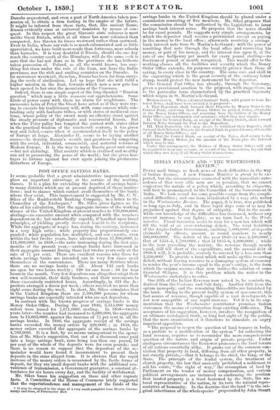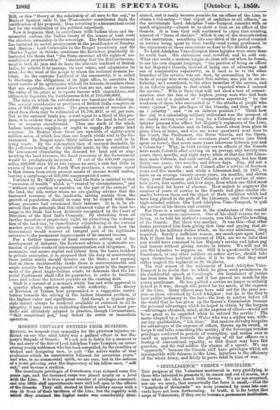INDIAN FINANCE AND " THE WESTMINSTER REVIEW."
EVERY mail brings us fresh news of fresh difficulties in the way of Indian finance. A new Finance Minister is about to be ex- ported, but the circumstances connected with the immediate ante- cedents of that very able man are so peculiar, that we cannot conjecture the nature of a policy which, according to etiquette, will first be promulgated to the Councillor of the Government in India. We look round for some possible escape from the compli- cated difficulties ; and one issue is indicated by a very able writer in the Westminster Review. The paper, it is true, was published so long ago as July, and in these rapid days sonic of us may be prejudiced against that degree of antiquity. But in the mean- while our knowledge of the difficulties has increased, without any present increase to our lights ; so we turn back to the West- minster. Fiscal invention seeks in vain for a new tax which will fill the void of an ever-widening deficit. The total liabilities of the Anglo-Indian Government, omitting 7,000,000/. of deposits claimable by officers, amount in round numbers to nearly 100,000,000/. The deficit of the year 1853-51 was 2,100,000/. ; that of 1554-5, 1,700,0001. ; that of 1855-6, 1,000,0001. ; while in the year preceding the mutiny, the revenue though nearly equal, still fell short of the expenditure, and the annual debt of 1860-1 will, it is probable, scarcely be covered by a less sum than 2,250,000/. To provide a fund which will make up this recurring deficit, without having recourse to a damaging system of economy to render the year's income equal to the year's outlay, is the form which the enigma assumes that now invites the solution of some financial (Edipus. It is this problem which the writer in the Westminster undertakes to solve.
One fifth of the Indian Revenue now raised is, he reminds us, derived from the Customs and Salt duty. Another fifth from the opium monopoly, and the remaining three-fifths are furnished by the land. Owing to the present faulty system of assessment, this last source of revenue, though capable of a vast development, is not now susceptible of any rapid increase. Yet it is in its aug- mentation that the Westminster contributor promises Indian statesmen the means of extrication from existing difficuties. The acceptance of his suggestion, however, involves the recognition of an ultimate sociological truth, so long lost sight of by the public, that the mere enunciation of it threatens to stimulate an angry impatient opposition.
"The proposal to reopen the question of land tenures in India, as a prelude to a modification of the system " for collecting the land revenue, requires us to reconsider the more comprehensive question of the nature and origin of private property. Under analogous circumstances the Reviewer pronounces the land tenure of all nations essentially alike. It grows out of the common con- viction that property in land, differing from all other property, is not strictly private,—that it belongs to the chief, the king, or the State. The principle of the feudal system, the treatment of church property, the law that anciently prohibited a nobleman to sell his estate, "the right of way," the resumption of land by Parliament on the tender of money compensation, and various political arrangements aro instanced as confirming the position that landed property is a trust bestowed by the State, the na- tural representative of the nation, in its turn the natural repre- sentative of humanity. In the doctrine that the land "is the ori- ginal inheritance of the whole species " propounded by Joha Stuart
Mill; or this" theory of the coheirship-of all men to the soil," as Herbert Spencer calls it, the Westminster contributor finds the justification of his proposal ; thus reverting to a hierarchical .social feet for the vindication of his political expedient.
Now it happens, that, in ADC° raance with Indian. ideas and im- memorial custom, the Indian theory of the tenure of bind vests the absolute ownership in the sovereign. The British Government has imitated its native predecessors in the presidencies of Bombay and Madras ; Lord Cornwallis in the Bengal presidency and Sir Charles Napier in Soinde, continues the. Reviewer, practicallyilr hietrated the thesis that " the State exercises all the rights of un- conditional proprietorship." Concluding that the British Govern- ment is both de jure and de facto the absolute landlord of British India, he solicits it to manage its vast estate, and administer its trust, for the weal of the people to whom.the national domain be- longs. As the supreme Landlord of the community, it is called to discharge the obligations of its high office, to ascertain the exact nature of its agreements with all its tenants, to confirm those that are eckuita.ble, and annul those that are net, and so increase the value of its estate as to equate income with expenditure, and ultimately liquidate the burthensame debt. of 100,000,0001
The data on which the calculations are basedare the-following. The several presidencies or provinces of British India comprise an. area of 868,906 square miles. The gross amount of revenue de- rived from them may be estimated at 16,706,392i. or 8d. per acre. But as the assessed lands pay a rent equal to &third of this pro- duce, it is evident that a large proportion. of the land is held scot free or remains uncultivated. Thus one sixth of the whole Indian territories supplies, or ought to supply, the entire land revenue. In Madras alone there are upwards of eighty-seven million acres, of which less than one fourth yields rent to the Go- vernment. In Bengal again thirty million acres are said to be lying waste. By the redemption then of usurped freeholds, by the judicious leasing of the cultivable lands, by the reduction of the assessment stimulating the demand for land, and so aug- menting the land revenue, the fiscal resources of the Government would be prodigiously increased. If out of the 850,000 square miles, 250,000 were let at two rupees- an acre, a sum but little in excess of the rent of the North West provinces, a revenue equal to that drawn from every present source of income would accrue, leaving a surplusage of 600,000 unappropriated acres. Fortified by Mr.. Mill's opinion, that the State is entitled to that "accession of wealth" which is "created by circumstances," and " without any exertion or sacrifice on the part of the owners" of the land, the able writer whom we are quoting advises that the increased revenues of the landlords, arising mainly from the growth of population, should in some way be shared with those whose presence had occasioned their increase. It is to be ob served that the principle that this enhanced value of the land be- longs to the State has been distinctly recognized by the Court of Directors of the East India Company. By abstaining from all further transfers of proprietary right, by permitting the redemp- tion of the land-tax, by immediately repurchasing at the current market price the titles already conceded, it is proved how the Government would recover an integral part of its legitimate revenues to the permanent improvement of its annual income. For a further increase of fiscal resources arising out of the development of industry, the Reviewer advises a systematic ex- tension of public works of intercommunication and irrigation. To economize and seoure capital and labour from the losses incident to private enterprise, it is proposed that the duty of constructing these public: works should devolve on the State ; and arguing that in these inexhaustible funds there is unexceptionable and ample security for the repayment of moneys spent in the improve- ment of the great Anglo-Indian estate, he demands that the Im- perial Parliament shall offer its guarantee, in order to facilitate loans and reduce the interest payable on the existing deht.
Such is a resurae of a. measure which has met with approval in a quarter where opinion speaks with authority. The theory of Revision of Tenure here propounded is a suggestive contri- bution towards the solving- of the Indian finaneial problem, of the highest value and significance. And though a typical prin- eiple cannot always be rendered available or enforced in all its integrity, it may serve as indicating direction and be at least par- tially and. ultimately adapted to practice,- though Circumstance, " that unspiritual god," may defeat. its entire or immediate aperatiom.



























 Previous page
Previous page